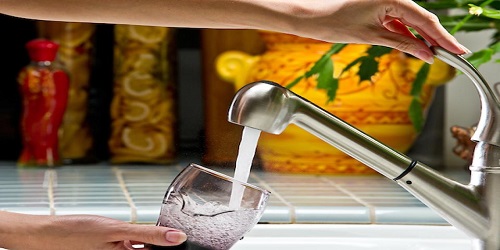Potable Meaning
The word potable comes from the Latin “potabilis” and this term in turn was derived from the verb “potare” which means to drink.
The term potable is applied to water that is suitable for human consumption without causing health problems. Water is absolutely necessary for the body, and about two litres per day are recommended to stay healthy, but only if this water is not contaminated with biological, chemical or radioactive agents, does not have excess minerals and has a pH of between 6.5 and 9.5.
Only fresh water is suitable for drinking, which is 3% of the total water on our planet, which is 1,400,000,000 cubic km of water. Only 0.3% of that 3% of fresh water is in rivers, lakes and streams. 19% is groundwater, 0.7% is in the atmosphere, and 80% is frozen in polar areas.
Purification is the process by which ordinary water is transformed into drinkable water. By adding chlorine, applying ozone or irradiating with ultraviolet rays, this conversion can be achieved in groundwater or springs. If the water from rivers or streams is boiled, the bacteria are eliminated, but it must be left to rest so that the toxic elements remain at the bottom.
In cities there are water treatment plants that are responsible for purifying water collected from surface water sources. The water arrives at the plant, is raised by pumps, a coagulant is added, it is left to settle so that it decants, it is filtered, chlorine and lime are added to balance the acidity, and it is then ready to be distributed through a network of pipes.
Despite the purification process, drinking water can contain very harmful substances such as arsenic, zinc, cadmium or chromium if these elements are present in the soil through which the water flowed. Industrial waste is responsible for most of these contaminants, as is the poor condition of the pipes.
According to UN estimates, around 900 million people in the world lack drinking water, especially those living in Africa.
By extension, it is said that something is feasible when it is feasible to carry out, it is good or beneficial: “This project is feasible, I think it is very feasible to carry it out” or “He is a feasible person, very open to dialogue and understanding.”
Potable Meaning in Hindi
पीने योग्य(Potable) शब्द लैटिन के “पोटेबिलिस” से आया है और यह शब्द क्रिया “पोटारे” से लिया गया है जिसका अर्थ है पीना।
पीने योग्य शब्द का प्रयोग ऐसे पानी के लिए किया जाता है जो स्वास्थ्य संबंधी समस्याएँ पैदा किए बिना मानव उपभोग के लिए उपयुक्त हो। पानी शरीर के लिए बिल्कुल ज़रूरी है और स्वस्थ रहने के लिए प्रतिदिन लगभग दो लीटर पानी पीने की सलाह दी जाती है, लेकिन केवल तभी जब यह पानी जैविक, रासायनिक या रेडियोधर्मी एजेंटों से दूषित न हो, इसमें अतिरिक्त खनिज न हों और इसका pH 6.5 से 9.5 के बीच हो।
केवल ताज़ा पानी पीने के लिए उपयुक्त है, जो हमारे ग्रह पर कुल पानी का 3% है, जो 1,400,000,000 क्यूबिक किमी पानी है। उस 3% ताजे पानी का केवल 0.3% नदियों, झीलों और धाराओं में है। 19% भूजल है, 0.7% वायुमंडल में है और 80% ध्रुवीय क्षेत्रों में जमे हुए हैं।
शुद्धिकरण वह प्रक्रिया है जिसके द्वारा साधारण पानी को पीने योग्य पानी में बदला जाता है। क्लोरीन डालकर, ओजोन लगाकर या पराबैंगनी किरणों से विकिरण करके, यह रूपांतरण भूजल या झरनों में प्राप्त किया जा सकता है। यदि नदियों या नालों के पानी को उबाला जाता है, तो बैक्टीरिया समाप्त हो जाते हैं, लेकिन इसे आराम करने के लिए छोड़ दिया जाना चाहिए ताकि विषाक्त तत्व नीचे ही रहें।
शहरों में जल उपचार संयंत्र हैं जो सतही जल स्रोतों से एकत्रित पानी को शुद्ध करने के लिए जिम्मेदार हैं। पानी संयंत्र में आता है, पंपों द्वारा उठाया जाता है, एक कोगुलेंट मिलाया जाता है, इसे जमने के लिए छोड़ दिया जाता है ताकि यह निस्तारित हो जाए, इसे फ़िल्टर किया जाता है, अम्लता को संतुलित करने के लिए क्लोरीन और चूना मिलाया जाता है, और फिर इसे पाइपों के एक नेटवर्क के माध्यम से वितरित करने के लिए तैयार किया जाता है।
शुद्धिकरण प्रक्रिया के बावजूद, पीने के पानी में आर्सेनिक, जिंक, कैडमियम या क्रोमियम जैसे बहुत हानिकारक पदार्थ हो सकते हैं यदि ये तत्व उस मिट्टी में मौजूद हैं जिसके माध्यम से पानी बहता है। औद्योगिक अपशिष्ट इनमें से अधिकांश संदूषकों के लिए जिम्मेदार है, जैसा कि पाइपों की खराब स्थिति है।
संयुक्त राष्ट्र के अनुमानों के अनुसार, दुनिया में लगभग 900 मिलियन लोगों के पास पीने का पानी नहीं है, खासकर अफ्रीका में रहने वाले लोग।
विस्तार से, यह कहा जाता है कि कोई चीज तब व्यवहार्य होती है जब उसे कार्यान्वित करना व्यवहार्य हो, वह अच्छी या लाभदायक हो: “यह परियोजना व्यवहार्य है, मुझे लगता है कि इसे कार्यान्वित करना बहुत व्यवहार्य है” या “वह एक व्यवहार्य व्यक्ति है, बातचीत और समझ के लिए बहुत खुला है।”

